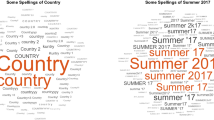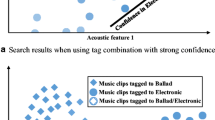Abstract
The cold-start problem is a grand challenge in music recommender systems aiming to provide users with a better and continuous music listening experience. When a new user creates a playlist, the recommender system remains in a cold-start state until enough information is collected to identify the user’s musical taste. In such cases, playlist metadata, such as title or description, have been successfully employed to create intent recommendation models. In this paper, we propose a multi-stage retrieval system utilizing user-generated titles to alleviate the cold-start problem in automatic playlist continuation. Initially, playlists are clustered to form a music documents collection. Then, the system applies latent semantic indexing to the collection to discover hidden patterns between tracks and playlist titles. For similarity calculation, singular value decomposition is performed on a track-cluster matrix. When the system is given a new playlist as a cold-start instance, it first retrieves neighboring clusters and then produces a ranked list of recommendations by weighting candidate tracks in these clusters. We scrutinize the performance of the proposed system on a large, real-world music playlists dataset supplied by the Spotify platform. Our empirical results show that the proposed system outperforms the state-of-the-art approaches and improves recommendation accuracy significantly in three primary evaluation metrics.








Similar content being viewed by others
Availability of data and material
The Million Playlist Dataset is publicly available at the time of this writing and can be accessed by registering on AIcrowd.
References
Aizawa A (2003) An information-theoretic perspective of tf-idf measures. Inf Process Manage 39(1):45–65. https://doi.org/10.1016/S0306-4573(02)00021-3
Antenucci S, Boglio S, Chioso E, Dervishaj E, Kang S, Scarlatti T, Dacrema MF (2018) Artist-driven layering and user’s behaviour impact on recommendations in a playlist continuation scenario. In: Proceedings of the ACM Recommender Systems Challenge 2018, Vancouver, BC, Canada, pp 4:1–4:6
Berry MW, Dumais ST, O’Brien GW (1995) Using linear algebra for intelligent information retrieval. SIAM Rev 37(4):573–595
Bollen D, Knijnenburg BP, Willemsen MC, Graus M (2010) Understanding choice overload in recommender systems. In: Proceedings of the Fourth ACM Conference on Recommender Systems, Barcelona, Spain, p 63-70
Bonnin G, Jannach D (2014) Automated generation of music playlists: Survey and experiments. ACM Comput Surv 47(2):1–35. https://doi.org/10.1145/2652481
Chen CW, Lamere P, Schedl M, Zamani H (2018) Recsys challenge 2018: Automatic music playlist continuation. In: Proceedings of the 12th ACM Conference on Recommender Systems, Vancouver, BC, Canada, p 527-528
Cremonesi P, Turrin R, Airoldi F (2011) Hybrid algorithms for recommending new items. In: Proceedings of the 2nd International Workshop on Information Heterogeneity and Fusion in Recommender Systems, Chicago, Illinois, p 33-40
De Gemmis M, Lops P, Musto C, Narducci F, Semeraro G (2015) Semantics-aware content-based recommender systems. In: Ricci F, Rokach L, Shapira B (eds) Recommender systems handbook. Springer, US, Boston, MA, pp 119–159
Faggioli G, Polato M, Aiolli F (2018) Efficient similarity based methods for the playlist continuation task. In: Proceedings of the ACM Recommender Systems Challenge 2018, Vancouver, BC, Canada, pp 15:1–15:6
Ferraro A (2019) Music cold-start and long-tail recommendation: Bias in deep representations. In: Proceedings of the 13th ACM Conference on Recommender Systems, Copenhagen, Denmark, p 586-590
Ferraro A, Bogdanov D, Yoon J, Kim K, Serra X (2018) Automatic playlist continuation using a hybrid recommender system combining features from text and audio. In: Proceedings of the ACM Recommender Systems Challenge 2018, Vancouver, BC, Canada, pp 1–5
Isinkaye F, Folajimi Y, Ojokoh B (2015) Recommendation systems: Principles, methods and evaluation. Egypt Informatics J 16(3):261–273. https://doi.org/10.1016/j.eij.2015.06.005
Järvelin K, Kekäläinen J (2002) Cumulated gain-based evaluation of IR techniques. ACM Trans Inf Syst 20(4):422–446. https://doi.org/10.1145/582415.582418
Kallumadi S, Mitra B, Iofciu T (2018) A line in the sand: Recommendation or ad-hoc retrieval? In: Proceedings of the ACM Recommender Systems Challenge 2018, Vancouver, Canada, pp 7:1–7:6
Kamehkhosh I, Bonnin G, Jannach D (2020) Effects of recommendations on the playlist creation behavior of users. User Model User-Adapt Interaction 30(2):285–322. https://doi.org/10.1007/s11257-019-09237-4
Kaminskas M, Bridge D (2016) Diversity, serendipity, novelty, and coverage: A survey and empirical analysis of beyond-accuracy objectives in recommender systems. ACM Trans Interact Intell Syst 7(1):1–42. https://doi.org/10.1145/2926720
Kaya M, Bridge D (2018) Automatic playlist continuation using subprofile-aware diversification. In: Proceedings of the ACM Recommender Systems Challenge 2018, Vancouver, BC, Canada, pp 1:1–1:6
Kelen DM, Berecz D, Béres F, Benczúr AA (2018) Efficient k-nn for playlist continuation. In: Proceedings of the ACM Recommender Systems Challenge (2018) Vancouver. BC, Canada
Kim J, Won M, Liem CCS, Hanjalic A (2018) Towards seed-free music playlist generation: Enhancing collaborative filtering with playlist title information. In: Proceedings of the ACM Recommender Systems Challenge (2018) Vancouver. BC, Canada
Kuhn A, Ducasse S, Girba T (2005) Enriching reverse engineering with semantic clustering. In: Proceedings of the 12th Working Conference on Reverse Engineering, p 133-142
Lam XN, Vu T, Le TD, Duong AD (2008) Addressing cold-start problem in recommendation systems. In: Proceedings of the 2nd International Conference on Ubiquitous Information Management and Communication, Suwon, Korea, p 208-211
Landauer TK, McNamara DS, Dennis S, Kintsch W (2013) Handbook of latent semantic analysis. Psychology Press, London
Li J, Jing M, Lu K, Zhu L, Yang Y, Huang Z (2019) From zero-shot learning to cold-start recommendation. Proceed AAAI Conf Artif Intell 33(01):4189–4196. https://doi.org/10.1609/aaai.v33i01.33014189
Lika B, Kolomvatsos K, Hadjiefthymiades S (2014) Facing the cold start problem in recommender systems. Expert Systems with Applications 41(4):2065–2073, https://doi.org/10.1016/j.eswa.2013.09.005
Liu NN, Meng X, Liu C, Yang Q (2011) Wisdom of the better few: Cold start recommendation via representative based rating elicitation. In: Proceedings of the Fifth ACM Conference on Recommender Systems, Chicago, Illinois, USA, p 37-44
Logan B (2002) Content-based playlist generation: Exploratory experiments. ISMIR. France, Paris, pp 295–296
Ludewig M, Kamehkhosh I, Landia N, Jannach D (2018) Effective nearest-neighbor music recommendations. In: Proceedings of the ACM Recommender Systems Challenge (2018) Vancouver. BC, Canada
Mimno D, Wallach HM, Talley E, Leenders M, McCallum A (2011) Optimizing semantic coherence in topic models. In: Proceedings of the Conference on Empirical Methods in Natural Language Processing, Edinburgh, United Kingdom, p 262-272
Musto C, Semeraro G, de Gemmis M, Lops P (2016) Learning word embeddings from wikipedia for content-based recommender systems. In: European Conference on Information Retrieval, Springer, pp 729–734
van Niedek T, de Vries AP (2018) Random walk with restart for automatic playlist continuation and query-specific adaptations. In: Proceedings of the ACM Recommender Systems Challenge (2018) Vancouver. BC, Canada
Papadimitriou CH, Raghavan P, Tamaki H, Vempala S (2000) Latent semantic indexing: A probabilistic analysis. J Comput Syst Sci 61(2):217–235. https://doi.org/10.1006/jcss.2000.1711
Park YJ, Tuzhilin A (2008) The long tail of recommender systems and how to leverage it. In: Proceedings of the 2008 ACM Conference on Recommender Systems, Lausanne, Switzerland, p 11-18
Pichl M, Zangerle E, Specht G (2015) Towards a context-aware music recommendation approach: What is hidden in the playlist name? 2015 IEEE International Conference on Data Mining Workshop. Atlantic City, USA, pp 1360–1365
Polignano M, Basile P, de Gemmis M, Semeraro G (2019) Social tags and emotions as main features for the next song to play in automatic playlist continuation. Adjunct Publication of the 27th Conference on User Modeling. Adaptation and Personalization, Larnaca, Cyprus, pp 235–239
Rashid AM, Karypis G, Riedl J (2008) Learning preferences of new users in recommender systems: An information theoretic approach. SIGKDD Explor Newsl 10(2):90–100. https://doi.org/10.1145/1540276.1540302
Robertson S (2004) Understanding inverse document frequency: on theoretical arguments for idf. J Document 60(5):503–520. https://doi.org/10.1108/00220410410560582
Rubtsov V, Kamenshchikov M, Valyaev I, Leksin V, Ignatov DI (2018) A hybrid two-stage recommender system for automatic playlist continuation. In: Proceedings of the ACM Recommender Systems Challenge 2018, Vancouver, Canada, pp 16:1–16:4
Saveski M, Mantrach A (2014) Item cold-start recommendations: Learning local collective embeddings. In: Proceedings of the 8th ACM Conference on Recommender Systems, Foster City, Silicon Valley, California, USA, p 89-96
Schedl M, Zamani H, Chen CW, Deldjoo Y, Elahi M (2018) Current challenges and visions in music recommender systems research. Int J Multimedia Inf Retr 7:95–116. https://doi.org/10.1007/s13735-018-0154-2
Stevens K, Kegelmeyer P, Andrzejewski D, Buttler D (2012) Exploring topic coherence over many models and many topics. In: Proceedings of the 2012 Joint Conference on Empirical Methods in Natural Language Processing and Computational Natural Language Learning, Jeju Island, Korea, p 952-961
Symeonidis P (2008) Content-based dimensionality reduction for recommender systems. In: Preisach C, Burkhardt H, Schmidt-Thieme L, Decker R (eds) Data Analysis, Machine Learning and Applications, Studies in Classification, Data Analysis, and Knowledge Organization. Springer, Berlin, Heidelberg, pp 619–626
Tran T, Sweeney R, Lee K (2019) Adversarial mahalanobis distance-based attentive song recommender for automatic playlist continuation. In: Proceedings of the 42nd International ACM SIGIR Conference on Research and Development in Information Retrieval, Paris, France, p 245-254
Vall A, Dorfer M, Eghbal-Zadeh H, Schedl M, Burjorjee K, Widmer G (2019) Feature-combination hybrid recommender systems for automated music playlist continuation. User Modeling and User-Adapted Interaction 29(2):527–572. https://doi.org/10.1007/s11257-018-9215-8
Volkovs M, Rai H, Cheng Z, Wu G, Lu Y, Sanner S (2018) Two-stage model for automatic playlist continuation at scale. In: Proceedings of the ACM Recommender Systems Challenge 2018, Vancouver, Canada, pp 9:1–9:6
Voorhees EM, Harman DK et al (2005) TREC: Experiment and evaluation in information retrieval, vol 63. MIT press Cambridge, MA
Weston J, Bengio S, Usunier N (2011) Wsabie: Scaling up to large vocabulary image annotation. In: Proceedings of the Twenty-Second International Joint Conference on Artificial Intelligence - Volume Volume Three, Barcelona, Catalonia, Spain, p 2764-2770
Yang H, Jeong Y, Choi M, Lee J (2018) Mmcf: Multimodal collaborative filtering for automatic playlist continuation. In: Proceedings of the ACM Recommender Systems Challenge 2018, Vancouver, Canada, pp 11:1–11:6
Yürekli A, Bilge A, Kaleli C (2020) Exploring playlist titles for cold-start music recommendation: an effectiveness analysis. Journal of Ambient Intelligence and Humanized Computing pp 1–20
Zamani H, Schedl M, Lamere P, Chen CW (2019) An analysis of approaches taken in the acm recsys challenge 2018 for automatic music playlist continuation. ACM Trans Intell Syst Technol 10:57:1–57:21, https://doi.org/10.1145/3344257
Zhao X, Song Q, Caverlee J, Hu X (2018) Trailmix: An ensemble recommender system for playlist curation and continuation. In: Proceedings of the ACM Recommender Systems Challenge 2018, Vancouver, BC, Canada, pp 8:1–8:6
Zhu L, He B, Ji M, Ju C, Chen Y (2018) Automatic music playlist continuation via neighbor-based collaborative filtering and discriminative reweighting/reranking. In: Proceedings of the ACM Recommender Systems Challenge 2018, Vancouver, Canada, pp 10:1–10:6
Acknowledgements
This work was supported by the Grant 20ADP172 from Eskişehir Technical University.
Author information
Authors and Affiliations
Corresponding author
Ethics declarations
Conflict of interest
The authors declare that they have no conflict of interest.
Code availability
The source code required to reproduce the experimental results is publicly available on a GitHub repository.
Additional information
Publisher's Note
Springer Nature remains neutral with regard to jurisdictional claims in published maps and institutional affiliations.
Rights and permissions
About this article
Cite this article
Yürekli, A., Kaleli, C. & Bilge, A. Alleviating the cold-start playlist continuation in music recommendation using latent semantic indexing. Int J Multimed Info Retr 10, 185–198 (2021). https://doi.org/10.1007/s13735-021-00214-5
Received:
Revised:
Accepted:
Published:
Issue Date:
DOI: https://doi.org/10.1007/s13735-021-00214-5




